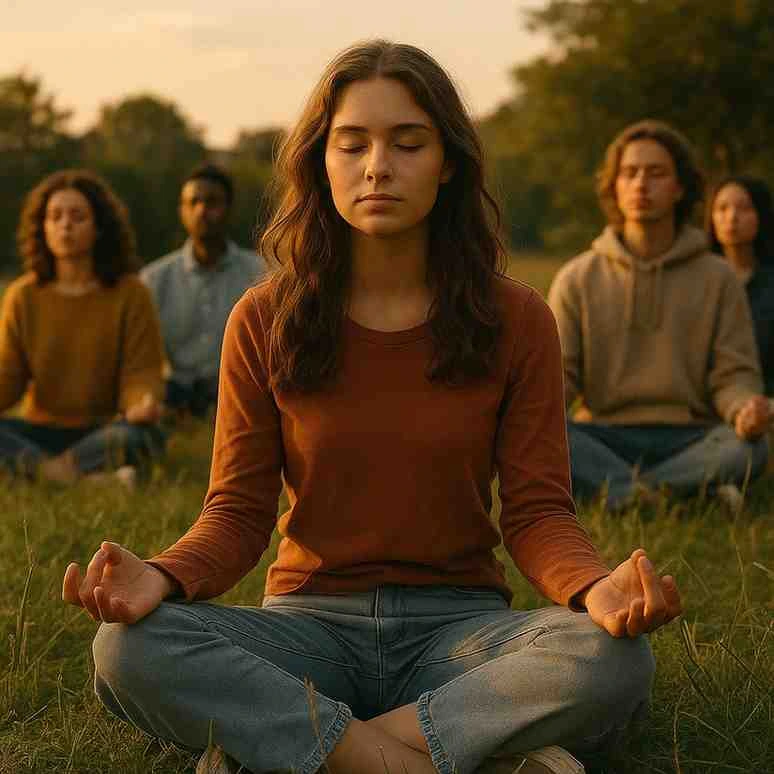Why Young People Are Rediscovering Spirituality Post-COVID
The COVID-19 pandemic changed the world in more ways than one. Beyond its impact on health and economy, it deeply affected the human spirit. The lockdowns, isolation, and uncertainty forced millions—especially young people—to look inward and question life’s meaning. In a world that once celebrated speed, success, and social media fame, the sudden stillness of the pandemic became a turning point. Out of fear and solitude emerged a new wave of spiritual awakening. Today, many young people are rediscovering spirituality, not as rigid religion, but as a personal path toward peace, purpose, and self-awareness.
A Crisis That Shook the Core
Before COVID-19, life for most youth revolved around careers, entertainment, and digital connection. The world seemed unstoppable. Then, within weeks, everything paused. Schools shut down, offices went remote, travel ceased, and the illusion of control disappeared. The experience exposed the fragility of modern life and left many questioning deeper truths: Who am I? What truly matters? Why is there so much suffering?
This global crisis created a collective moment of reflection. The outer world had stopped, but the inner world had begun to stir. Many young people, faced with anxiety, loneliness, and fear of loss, turned toward practices that provided comfort—meditation, prayer, journaling, and reading spiritual texts. What started as a coping mechanism slowly became a journey of rediscovery.
The Shift from Religion to Spirituality
One of the most striking features of this post-pandemic era is that young people are not necessarily becoming more “religious” in the traditional sense. Instead, they are becoming more spiritual. This means they seek personal experiences of peace, rather than belonging to a specific institution or dogma.
During COVID-19, temples, mosques, churches, and gurdwaras were closed. Worship went online. This decentralization of religion made many realize that the divine is not confined to a place—it can be found anywhere, even within. Spirituality, for many, became an inner practice rather than an outer ritual.
Young people began to meditate, explore yoga, study mindfulness, or simply spend quiet moments in nature. These practices transcended boundaries of faith and culture. They represented a hunger for authenticity and inner balance in an age of digital noise.
Technology as a Tool for Inner Growth
Ironically, the same technology that once distracted the youth also helped them reconnect spiritually. During the lockdowns, social media platforms became sources of inspiration. Spiritual teachers, psychologists, and mindfulness coaches started sharing messages of hope and resilience online. Apps for meditation and gratitude journaling saw millions of new users.
YouTube channels streamed discourses on healing and purpose. Podcasts and online communities encouraged open conversations about consciousness, well-being, and self-care. This digital awakening made spirituality accessible, relatable, and modern. It allowed young people to explore ancient wisdom in new, engaging ways—often from their own bedrooms.
Healing the Mental Health Crisis
The pandemic also exposed another reality: a silent epidemic of mental distress. Anxiety, depression, and burnout rose sharply, especially among youth. Traditional solutions—therapy, medication, or distraction—offered limited relief. In contrast, spirituality provided something deeper: inner peace and resilience.
Meditation, prayer, and gratitude practices helped calm the nervous system. Spiritual reading gave hope and meaning to suffering. Many discovered that healing does not come only from outside help, but also from within. The understanding that one can be both broken and blessed at the same time gave strength to countless young hearts.
Spirituality taught them acceptance—that not everything can be controlled, but everything can be understood. This shift in perspective helped many move from fear to faith, from restlessness to reflection.
The Rise of Conscious Living
Post-COVID spirituality is not just about prayer or meditation; it is also about conscious living. Young people are increasingly aligning their choices with values like compassion, sustainability, and mindfulness. They are questioning materialism and choosing meaningful careers over high-paying but empty jobs.
Movements promoting veganism, minimalism, and mental well-being are not only lifestyle trends—they reflect a deeper spiritual transformation. The idea of success is changing from “having more” to “being more.” For many, spirituality now means living with awareness—toward oneself, others, and the planet.
The Need for Belonging and Community
Lockdowns showed how essential human connection is. The sense of isolation drove many to seek community—not just social, but soulful. After COVID, spiritual groups, online satsangs, and wellness retreats have become more popular among the youth. They offer a space to share, heal, and grow together.
In a fragmented world, these spaces provide belonging without judgment. Here, young people can explore their beliefs freely, celebrate diversity, and rediscover compassion. The rise of interfaith dialogue and global meditation events shows a growing recognition that all paths lead to the same truth—love, unity, and peace.
From Survival to Spiritual Growth
Ultimately, the pandemic forced humanity to face mortality and impermanence. It reminded everyone that life is precious and unpredictable. For young people, this realization was transformative. The focus shifted from surviving to truly living—from chasing temporary highs to finding lasting peace.
Many describe this new spirituality as “coming home to oneself.” It is less about worship and more about awareness; less about fear of God and more about love for life.
Conclusion: A Generation Awakened
The post-COVID generation is different. They have witnessed chaos, uncertainty, and loss—but also resilience, empathy, and inner strength. This has awakened in them a spiritual curiosity that goes beyond religion. They seek truth, peace, and connection—not in temples or doctrines, but in everyday mindfulness and acts of kindness.
In rediscovering spirituality, young people are not escaping the world—they are engaging with it more consciously. They are redefining what it means to be spiritual in the modern age: to be aware, compassionate, and deeply human.
Perhaps the greatest lesson of the pandemic is this—that when the world stands still, the soul begins to move. And it is this movement, quiet yet powerful, that is shaping the spiritual future of a new generation.
~Religion World Bureau










